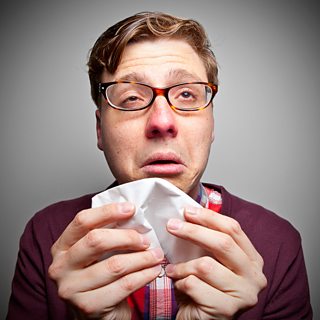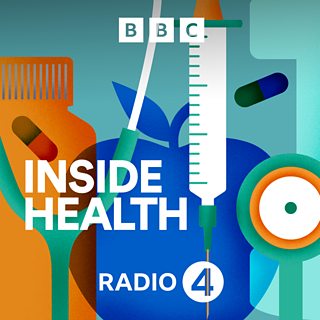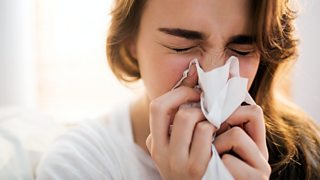How do cold and flu remedies actually work?
As the days turn colder and the nights draw in, the sounds of coughs and colds seem to be all around us. For ±«Óãtv Radio 4's Inside Health, presenter James Gallagher is getting ahead of himself and stockpiling with remedies for the dreaded winter flu season. It's almost inevitable that many of us will be hit by colds at this time of year, so what can we do to fend them off?
For help navigating the stacked pharmacy aisles, James turns to Dr Margaret McCartney, Inside Health's resident GP and an expert in evidence-based medicine, Dr Lindsay Broadbent, a lecturer in virology from the University of Surrey, and pharmacist Reshma Malde. The group discuss the plethora of medications available, and whether they really help at all. Here's what James found out...
Most cold and flu symptoms are caused by our immune system
Almost all cold and flu medications reduce the symptoms of the illness, not treat the illness itself. Dr Lindsay Broadbent explains that "when we get infected with a virus, particularly a respiratory virus, it's our immune system that actually causes a lot of the symptoms that we experience." We generate mucus, which has protective enzymes to fight off bacteria, while down-regulating our bodies' natural processes for clearing this mucus. We also release cytokines and chemokines to activate and direct immune cells respectively. Unfortunately, these are responsible for the fever, aches and pains of more serious colds.
The first bit of advice that I would give all my customers is increasing the amount of fluid that you're taking in.Pharmacist Reshma Malde
Bed rest and time are the best solutions for cold and flu, but sometimes you have to get to work or take the kids to school. By inhibiting the symptoms of these natural bodily processes, medications can allow us to push through the day.
Cold and flu tablets are a matter of taste
James talks to pharmacist Reshma Malde from John Bell & Croyden to examine the full range of cold and flu medications out there.
The cold and flu tablets you grab off the shelf are mainly determined by one thing – flavour. Some people will also swear that hot-drink sachets work better than tablets despite having the same active ingredients – and there might be some logic to this. Putting your sachet into a hot drink gives you a comforting, warming effect and keeps you hydrated. As Reshma says: "One of the basic advice that I would give all my customers is trying to increase the amount of fluid that you’re taking in."
Paracetamol reduces fevers and acts as a painkiller, while phenylephrine is sold as a decongestant. Dr McCartney points out that clinical trials show that oral remedies containing it aren't effective.

Cough medicine works by suppressing irritation
Cough medicine is for those more serious colds that have moved down into your chest. They last longer, they can be more painful, and they can relapse. Naturally we'd like to imagine that cough remedies can bring this cycle to an end.

Dry, tickly coughs occur when phlegm isn't coming out yet, but that sudden urge to cough keeps you awake at night. Medicine based in sweet, sticky glycerol syrups is fantastic for coating the back of the throat. Active ingredients such as dextromethorphan can also trick your brain into ignoring the trigger for a cough. For chesty coughs, cough remedies with guaifenesin are the most effective; they shake loose the last dregs of your cold by breaking up a particularly sticky layer of mucus known as catarrh.
Although coughs are particularly frustrating, rest assured knowing that they're literally keeping you alive. Coughing ejects foreign liquid and matter that would otherwise end up in our lungs. Our airways become more sensitive by expressing higher amounts of TRP channels (pronounced 'trip') during infection. These channels fire off sensory neurons that keep our airways clear by coughing.
Throat lozenges are more than just glorified sweets
When it comes to cold and flu remedies, some people dismiss throat lozenges as being little more than glorified sweets. But most lozenges are medicated and contain active ingredients. Plus, in randomly controlled trials, throat lozenges show a small reduction in perceived pain when compared to placebo sweets.
So how do lozenges actually reduce pain? Firstly, the sweet part of lozenges does your body good. Liquid sugars help to moisten and soften the back of the throat, easing irritation. Moving to more medicated options, lozenges with menthol or eucalyptus can provide a perceived soothing and cooling effect to the inflamed area. Lozenges containing anti-inflammatories take this one step further by reducing swelling and numbing pain when swallowing.
Nasal sprays are a prevention not a cure
One of the few options for targeting the cause of the illness itself is anti-viral nasal sprays. Naturally, however, there are a few sceptics – if these sprays really work, how are they not the number one product on the market? Dr Broadbent herself explains that "the claim of being anti-viral to start with I have issues [with] because anti-virals are a specific thing".
Although it doesn't actually help us, menthol triggers the sensation that your airways are being opened, much like stepping out into a brisk cold day.
Firstly, these sprays are preventative, not curative. Using these sprays during cold season is purported to create a protective layer on your inner nasal mucosal lining that will kill cold viruses before they get inside. Secondly, nasal sprays only block one route of infection – inhaling through your nose. Inhaling through your mouth will get you infected, not to mention alternative routes such as your eyes.
Menthol vapour rubs provide more comfort than actual relief
Menthol vapour rubs tends to be the go-to cold solution for parents with poorly children.
Presenter James recalls fondly the times when his own mum would slather some vapour rub on his chest when he was ill and couldn't get to sleep as a child, and would leave him to slumber in a menthol paradise. This strong childhood association may be be the reason why so many UK residents swear by menthol vapour rubs – they're comforting, just like your mum.
It's hard to test whether these menthol vapour rubs actually improve kids' sleep, but there is some logic. Menthol triggers the sensation that your airways are being opened, much like stepping out into a brisk cold day. Although it doesn't actually help us, it feels as though the congestion and inflammation are being alleviated. And it's possible that thinking that's what's happening is all we need.
The placebo effect is very powerful
If there's one thing clinical trials with cold and flu medications have proven without a doubt, it's that the placebo effect is powerful. Placebos still cause a perceived symptomatic relief for patients. If we think we feel better, we really do.

It is worth asking though – if placebos can elicit almost the same relief as most cold and flu medications, is it really worth shelling out the extra cash to buy them? Even home remedies such as a bowl of steaming water might be more effective in getting you through the rough patch of an illness.
With no 'wonder drugs' for getting through winter, it's a wonder that the cold and flu drug market is a multi-million pound industry. Dr McCartney wants more transparency on the efficacy of these drugs so consumers know what they're really buying. "If we knew all the facts and if we had plain packaging that said exactly what the risk-benefit equation was, I wonder how much we would spend," she says.
To hear more about the world of cold and flu treatments, listen to the episode in full.
And you can find more episodes of ±«Óãtv Radio 4's Inside Health to listen to here.
The information contained in this article was correct at the time of broadcast on 24 October, 2023.
The episode was presented by James Gallagher and produced by Tom Bonnett.

More from ±«Óãtv Radio 4
-
![]()
How effective are these hay fever remedies?
Greg Foot looks at the various treatments for Sliced Bread.
-
![]()
Migraines and Headaches
James Gallagher learns about migraine prevention drugs.
-
![]()
Do anti-snoring products really work?
Greg Foot looks at the options for a disruption-free sleep.
-
![]()
10 easy ways to boost your health and wellbeing during your working day
Michael Mosley's guide.





